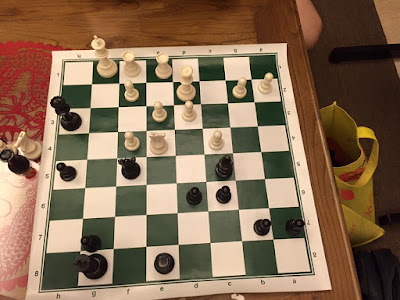How I trained in 2012?
The training is more about constant repetitive practice. In
any sport, the athletes train, run, do practice drills to keep themselves sharp
and always ready. Similarly in chess, we must keep ourselves sharp by going
through chess games and improving every aspect of chess (endgame, positional
chess, endgame, etc). I did that using chess books.
1.
I played through chess games from Kramnik’s best
games of chess, Anand’s best games, my system. You can use any book you feel
will help you the best (could be Tal’s or Fischer, anyone). The idea is that
you see 3-4 or more full GM chess games a day so that you would get accustomed to
moves made by GMs so when you face one, you will be less nervous/afraid. You
get the point right? The words I use to describe it is you see 3-4 GM games a
day, in 6 months u see 200+, you don’t feel like the GM is doing anything
special except maybe for a few moves here or there. After I go through each game,
I will put the book aside and play through that game again without the book.
You tend to remember the game better if you understand it.
2.
I study a lot of endgames. Endgames are very dry
and boring, especially the theoretical ones. The books I used were of a more
practical nature and thus, were more ‘fun’ to study. I used Test your endgame
ability by August Livshits and Jon Speelman. I also used “the Greatest chess
endings ever played”. This book didn’t just show the endgame, it shows you how
the endgame was reached which is helpful since it goes through the whole game
(see 1 above). It also helps in the sense that you can connect opening to
middlegame to endgame and this helps you to learn the skill of knowing and recognizing
possible endgames which are good for you while you are still in the middlegame.
Many famous GMs have said that to learn chess, you must first study the
endgame.
Jan-June (University: 2-4 hours training a day)
I didn’t have a lot of time during this period. Basically I wake
up around 630. I do 2 first, I always study endgames first (Notice that I didn’t
study openings). Then I proceed to play through a game. I always do at least 1
of both but I try to do 2-2. Then I go to class at 9am. Then I spend 1-2 hours
at night before I go to sleep doing that same routine.
I do more on weekends but not much more. Basically, this was
my bread and butter during the training. Endgame and GM Games. Consistency is
the important thing here. Every day, no exceptions except during exam days and
day before.
July-Aug (whole day free)
This was when I studied openings in addition to the bread
and butter training. I used the GM Repertoire books and many others. I basically
read 5 Opening books during this period.
The opening books didn’t help me as much as going through
games and endgames did which helps you recognize themes and patterns better. I
am not saying openings aren’t important. I basically just restudied/revised
them while preparing for my opponent before the games during Olympiad.
You can use any book you like. It depends on your strength.
You should always use books that are just beyond your current strength, like at
the edge of your limits. It’s like weight lifting. You find it hard to lift 20kg
but after repetitive practice, you will find it to be easy. Then you lift a 21
kg weight until it becomes easy, and so on.

Comments
Post a Comment